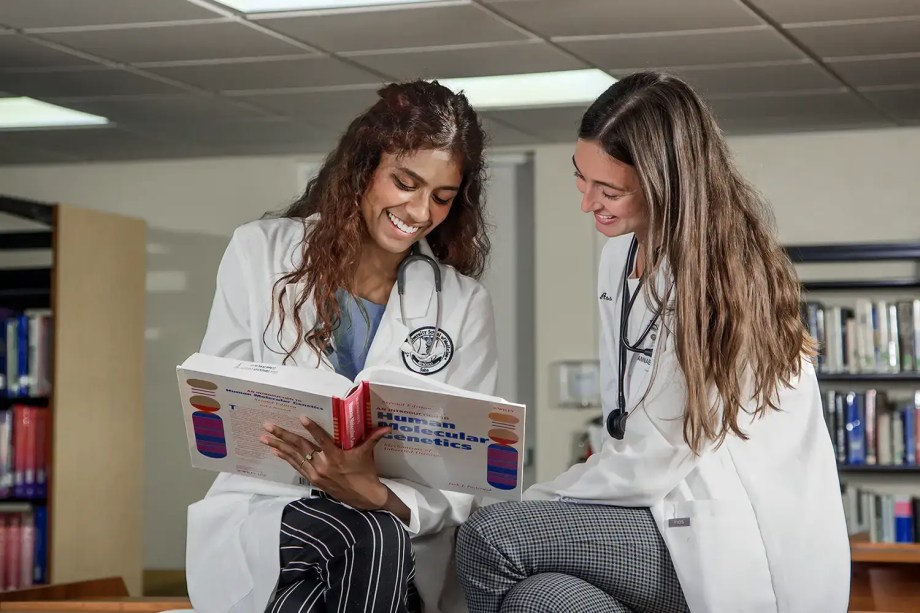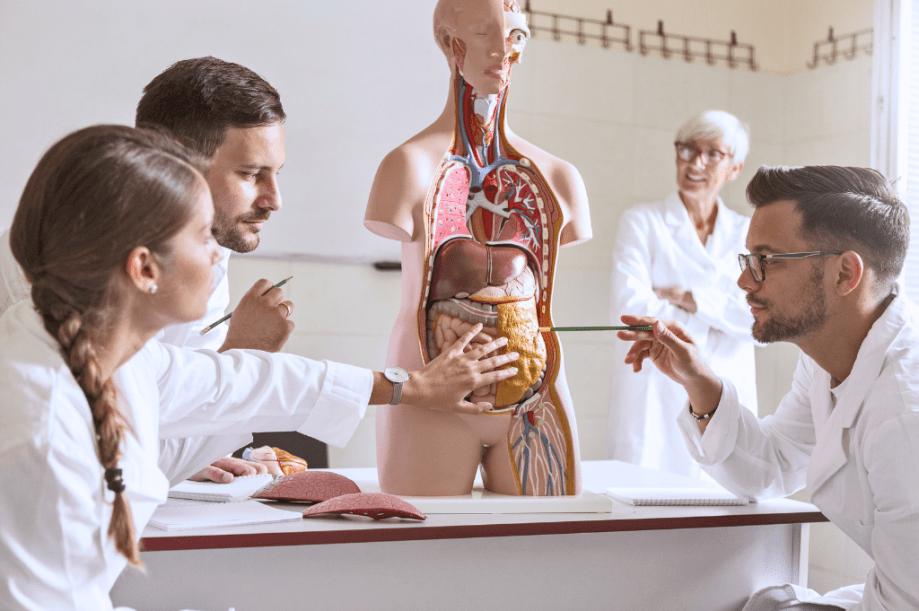
Medical School After Military Service: A Veteran’s Guide to Success
Find out how veterans can transition into careers as practicing physicians.
Transitioning from the military into medicine may sound like an unlikely career path. However, medicine is an alternative avenue to continue serving the public for many veterans and reservists. Entering a Doctor of Medicine (MD) program and pursuing a career as a physician allows them to apply their skills in a meaningful and rewarding way.
Becoming a doctor after military service is a good option for those interested in the medical field, providing an opportunity to learn, develop new skills and build a successful, stable career.
Medical schools have become a popular option for veterans and reservists looking to pursue their medical degree after military service, offering a pathway to combine their military experience with a fulfilling career in medicine.
So, let’s explore the benefits of an MD program for veterans and why becoming a medical doctor after service is a plausible and attractive transition for many former military members.
Why do Veterans Make Great Physicians?
Pursuing an MD program after military service makes sense for veterans and reservists as many core skills and attributes that make a successful military service member are transferrable to medicine, including performing in high-pressure environments, adapting to complex scenarios and practicing strong discipline.
Here are some important factors that make veterans and reservists perfect for a successful career in medicine:
Discipline and commitment
A strong work ethic is perhaps the most obvious connection between veterans and doctors. The demands of military service instill discipline and commitment, essential qualities required for medical school and throughout clinical practice.
Adaptability
The transition from the military to medical school has similarities in the unpredictability of the work and necessity for adaptability. The dynamic field of medicine requires flexibility, with medical professionals often facing complex scenarios in a fast-paced environment.
Leadership
Teamwork is one of the most important aspects of being a doctor. One of the benefits of pursuing a medical career after military service is that veterans often have experience leading teams and working collaboratively in high-pressure environments.
Benefits of Pursuing an MD Program as a Veteran
Choosing to pursue an MD program after military service offers both personal and professional benefits, including the opportunity to develop transferable skills and access a stable career.
Let’s explore some of the main benefits of a medical career for veterans and reservists.
Rewarding career path
Serving in the military has many similarities to serving the public as a doctor. Both careers offer rewarding roles and many responsibilities. Veterans and reservists often seek fulfillment in a career that allows them to continue making a positive impact in people’s lives.
Excitingly, former service members who successfully complete the MD program at Saba University School of Medicine are eligible to apply for residency and eventually practice at a Veterans Affairs (VA) medical facility, meaning they can remain connected to the military if that is their goal.
Leadership opportunities
Becoming a doctor after military service allows veterans and reservists to use their leadership skills in various ways, from leading teams to heading medical research and education.
Financial aid for veteran medical students
One of the main obstacles for veterans and reservists pursuing an MD program after military service is the high fees required to attend medical school. In the U.S., many veterans use the GI Bill to pursue a graduate degree, which can significantly reduce the cost of medical education.
Learn new skills
As mentioned, veterans and reservists can benefit from their many existing skills during the shift from the military to medical school. However, they can also develop new skills and knowledge, including hands-on care, research and analytical skills.
Steps to Transition from Military Service to Medical School
Transitioning from the military to medical school is an exciting prospect that requires preparation and research. Veterans and reservists can follow these steps to ensure a smooth transition into medical school:
1. Assessing readiness and passion for medicine
Before committing to pursuing an MD program, ensure your long-term goals and skills are aligned with the journey you are about to start. This reflection is key to preparing for medical school.
2. Completing Prerequisite Coursework
There are several prerequisites to meet before pursuing an MD program. Ensure you have the required coursework in science-based undergraduate subjects, which includes one year of biology, one year of inorganic and organic chemistry, and more. If you have not completed the prerequisite coursework, you can also consider medical preparation programs, such as a pre-medical Master’s.
3. Preparing for and Taking the MCAT
The Medical College Admission Test (MCAT) is a required component of your application for U.S. students, and all students are encouraged to take the MCAT. MCAT preparation for veterans can be challenging and often requires enrolling in preparatory courses to perform well.
4. Applying to Veteran-Friendly Medical Schools
It is essential to apply to medical schools that align with your needs and career goals. Veterans must research various schools and locations to find the most suitable medical school.
Veterans should also utilize military education benefits and scholarships to fund their medical education. Researching the GI Bill (United States) and other financial aid is essential for many veterans to understand the financial investment required to undertake an MD program.
5. Highlighting Military Healthcare Experience
If you have medical experience that you gained during your military service, it is important to highlight this whenever possible. Whether in your personal statement, admissions interview, letters of recommendation or elsewhere, be sure to share how your military experience prepared you for a career in medicine with tangible examples.
This can be as simple as hands-on experience administering a first aid response, which demonstrates that you know how to deliver healthcare-related interventions. Share how you managed the stress, what you were thinking and what the outcome was. This will be eye-catching for an admissions evaluator.
Overcoming Challenges as a Veteran Medical Student
Medical school is notoriously challenging for all students, with an extensive curriculum, rigorous workload and competitive environment. In addition to this, veterans and reservists may face other challenges due to their untraditional entry into the medical field.
One of the main challenges veterans and reservists face in the transition from the military to medical school is adjusting to an academic schedule. Due to extended periods since they were last in school, they may struggle in the return to the classroom. Medical school requires long study hours and extended periods in lectures or labs, which may be a challenge for those adjusting to the demands of an MD program after military service.
Other challenges that veterans and reservists should be aware of and prepared to overcome are maintaining a healthy work-life balance, managing your physical and mental health, and dealing with stress. Military training will have provided many of the tools you need to manage these challenges, and medical schools also deliver student support services that provide further help. Remember, meaningful support is often just a phone call or email away!
How Can Medical Schools Support Military Veterans?
It is important for veterans and reservists to choose a medical school that can support them during the transition into medicine from the military.
Medical schools have dedicated support services, wellness initiatives and mental health programs that can benefit veterans and reservists, including guidance on the admissions process and academic help throughout the MD program.
Veterans and reservists should also research medical schools that offer financially accessible MD programs and scholarship opportunities to assist with the financial challenges of pursuing a medical degree. SUSOM accepts the GI Bill to help pay tuition and our Financial Aid team is available to help you with your application. Each year, SUSOM welcomes veterans and reservists into our supportive MD program through this pathway.
U.S. veterans considering becoming a medical doctor after military service should also research the Yellow Ribbon Program and relevant financial support.
Conclusion
Now that you understand the benefits of an MD program for veterans and reservists, it is time to find a medical school that will help you achieve success academically, personally and in your medical career.
Saba University School of Medicine (SUSOM) fosters a supportive academic environment where 3,000+ students have graduated from the MD program since 1992. Graduates then go on to achieve residency placements at high rates and practice in the U.S., Canada and internationally.
“At SUSOM, we love working with candidates from the military – they have the grit and drive to become excellent medical doctors,” said Gabrielle Nydam, Director of Student Recruitment for Saba University School of Medicine. “They want to give back and simply need the opportunity to succeed. If you’re looking for a structured, supportive environment that can help you become a great physician, this is the place to be!”
If you’d like to learn more about what’s it’s like to attend SUSOM, check out this video testimonial from a student:
Then, when you’re ready to begin your journey, apply or contact us with any questions you may have.
FAQs About Transitioning from the Military to Medical School
Yes, entering an MD program after military service is a great option for veterans or reservists. Becoming a medical doctor after military service provides a stable, rewarding career and is an alternative way to continue serving the public in a personally enriching role.
While there are no official statistics outlining the acceptance rate for veterans or reservists in medical school, veterans have many transferable skills and valued qualities required as physicians. Therefore, veterans are usually competitive applicants for medical school, once they have completed the required pre-requisites.
Experiences in the military develop core skills and qualities that are essential to successfully practice medicine. From commitment and discipline to adaptability and leadership, veterans and reservists have what is required to become a medical doctor after military service.
The United States GI Bill is one of several initiatives that reduce the financial burden for U.S. veterans and reservists looking to enter an MD program after military service. There are many factors to consider, including living costs and tuition when working out whether the GI Bill will cover the full cost of your medical education. U.S. veterans considering becoming a medical doctor after military service should also research the Yellow Ribbon Program and each school’s scholarships and grants.

For prospective students
Saba is committed to supporting prospective students with any questions or queries throughout the application process. Please see the following links for detailed information about each topic:
If the information you are seeking is not provided here, please get in contact by contacting via WhatsApp here.


